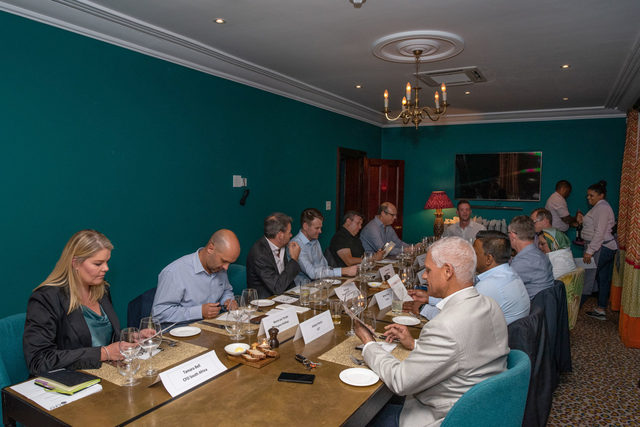The group of CFOs considered how they can support innovation in their organisations.
On 19 November, seven CFOs from various industries gathered at The Stack in Cape Town to connect, share knowledge and learn from an inspirational speaker over good food and fine wine.
The CFOs included Afrimat’s Pieter de Wit, Homechoice’s Jason Wright, Pragma Holdings’ Morne van Tonder, Tellumat’s Graham Meyer, UCT’s Ashley Francis, the V&A Waterfront’s Narriman Taliep, and Woolworths’ Justin Crowhurst. The dinner was made possible with the support of Oracle.

Ian Russel, the disruption guru, set out to rattle their cages, provoking the CFOs to think about disruptive behaviours within their organisations.
In this day and age, it's impossible to have a discussion with any business executive without the word disruption featuring into the conversation.
Disruption is not a conversation topic that can happen in isolation, it’s almost impossible to speak about disruption without including elements of innovation and the Fourth Industrial Revolution.
The CFOs, who represented industries including retail, education, mining and technology, expressed their views about how disruption is affecting their business.
They all agreed that they needed certain skills sets to weather the storm and to stay relevant. The skills they highlighted were adaptability, agility and being forward-thinking. Essentially, they said, CFOs must anticipate change before it happens – disrupt or be disrupted.

Justin Crowhurst from Woolworths added that VUCA (volatility, uncertainty, complexity and ambiguity) is the framework they incorporate to analyse their business decisions.
With AI and robotics being incorporated into finance teams, a significant amount of time is freed up from traditional accounting. Ian asked, “With all the extra time what are YOU doing to remain relevant?”
Following on from Ian’s comments there was a long silence in the room as CFOs reflected on changes they needed to make to remain relevant.
Jason and Pieter pointed out that CAs and their analytical thinking skills add enormous value to business. They help to review and analyse decisions based on their experience within the business that technology and automation simply don’t provide. Although the role of the CFO is changing, the custodian of the numbers will never be replaced outright, but rather complemented with tech and deep understanding of both business and insights. The CFOs agreed that using data and insights in meaningful ways is how they will continue to add value.
Despite the significant value that CAs bring to the table, the conversation again returned to the point that this certification is not the only way to add value to finance teams. “Finance teams are no longer the traditional team of CAs we were used to in the past. It is imperative that finance professionals broaden and enhance their skill set in order to remain relevant,” said Ashley.
It is well known that corporate structures can hamper innovation, and one of the most important steps a CFO can take to keep themselves and their team relevant is to dismantle these structures.

Afrimat CFO Pieter de Wit feels individuals should be allowed to make mistakes, “in order for innovation to be born”.
A common theme raised was that skills transfer is critical between the older generations with institutional and business knowledge and the younger generation who are tech savvy, creative and adaptable. Organisations that can adopt this knowledge-sharing mindset will catapult their business ahead of their competitors.
There was a strong focus on building a resilient and well-rounded team who have the skills and EQ to drive and guide businesses through the inevitable changes on the horizon. “Think ahead, plan accordingly and ensure you are being proactive and not reactive” were how CFOs planned to do this.
George Ferreira, senior sales director – applications, at Oracle said:
“People are concerned about the rate and pace at which the world is now evolving, the reality is that this pace is only going to increase, and we need to build a mindset and skillset in order to be able to adapt to the imminent changes.”
The fact remains – what got you here won’t get you there. All the CFOs agreed that the time to do things differently is now. Supported by their peers, an excellent speaker, and doubtless the fine food and wine, they left with much to think about and put into action in their own spheres of influence.















